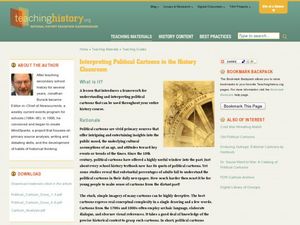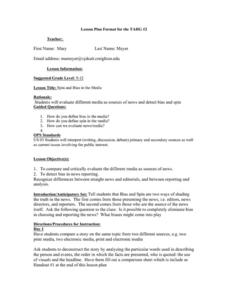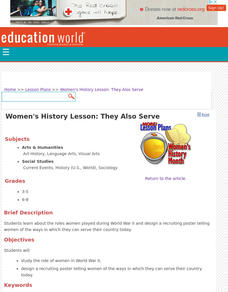Curated OER
American Civilization
First graders research and examine various events during the American Revolution. They locate the thirteen colonies on a map, create Boston Tea Party boats, and construct Paul Revere paper lanterns.
Curated OER
John Brown, Then and Now
Eleventh graders study one of the selected images of John Brown and read an excerpt online that describes his role in the Civil War. They identify significant information about John Brown. They think about how this applies to current...
National First Ladies' Library
The Flying Inauguration of the "Sudden President
Students study the inauguration process as well as what the constitution states about who succeeds the President of the US when the office is emergently vacant. They discuss the role of government and the events leading to Lyndon...
Curated OER
Bernardo de G??lvez: Supporter of the American Revolution
Eighth graders explore the assistance to the American Revolution provided by Spain. Through class discussion and research, they gather information about Bernardo de Galvez and his role during the Revolutionary War. Students synthesize...
Curated OER
Historical Presents
Students research events, trends, and phenomena of specific years in the twentieth century, then design "time capsules" to commemorate those years.
Curated OER
The World's Tallest Building
Students investigate the world's tallest buildings. In this architecture lesson plan, students discover how humans change the physical environment. Students read about and view pictures of famous buildings in the world. Students make...
Curated OER
Questions of War and Peace: Using Case Studies to Teach the History of American Foreign Policy
Students read three case studies to focus on how the United States dealt with foreign policy issues. In groups, they read about the decision to drop the atomic bomb, the commitment of troops to Vietnam and wwhether to send troops to...
Curated OER
The Political Dr. Seuss
High schoolers discuss the role political cartoons have played in U.S. politics and public affairs since the 1700's. They analyze some of the political cartoons Dr. Seuss drew during World War II and discuss how these cartoons conveyed...
Curated OER
Recycle, Reduce, Reuse and Save a Tree
Young scholars examine how to save and protect trees. For this conservation lesson, students read books about the usefulness of trees, write ideas in their journals about how trees can be used, and make a book of ways to protect trees.
Curated OER
To Join or not to Join the League of Nations - That is the Question
Students evaluate the possible reasons the United States did not become part of the League of Nations. In this World History activity, students discuss the pros and cons of what might have happened if the United States had joined the...
Curated OER
The Decision to Go to War
Learners examine President Bush's decision to go to war with Iraq. They work together to discuss a topic related to this given to them by their teacher. They answer questions to complete the lesson.
Curated OER
Always Remember, or Eventually Forget
Students examine one writer's opinion about how different generations of Japanese citizens have been influenced by the bombings of Hiroshima and Nagasaki.
Curated OER
Overcoming Censorship Through Art
High schoolers examine and discuss government-imposed censorship of art and artists' methods for counteracting censorship. They view censored artwork, write a persuasive essay, and create an art piece.
Curated OER
Interpreting Political Cartoons in the History Classroom
Students analyze political cartoons. For this historical perspectives lesson, students use the provided cartoon analysis worksheet to examine the political cartoons that their instructor shares with them.
Curated OER
You and the U.S. Constitution
Fourth graders write new rules of their school. In this rules and U.S. Constitution lesson plan, 4th graders discuss why we celebrate the fourth of July and examine the U.S. Constitution. Students discuss the differences between people...
Curated OER
The California Recall Election
Learners identify facts about the structure of the California recall election. They research the history of recall elections throughout the United States. They analyze the positives and negatives of a governor recall election.
Curated OER
Budgets: The Cost of Running a Planet
Learners develop a personal and planetary budget. They explore the "Spending Central" section of the ING website, discuss why we keep personal budgets, and in small groups complete a worksheet in which they create a budget for the planet.
Curated OER
Spin and Bias in the Media
High schoolers compare different types of media. In this media comparison lesson, students will assess the where all types of media gets its information by viewing a video of a news story and critiquing it.
Curated OER
They Also Serve
Learners explore the roles women played during World War II. They design a recruiting poster telling women of the ways in which they can serve their country today and present their posters to the class.
Curated OER
You Be the Judge
Students research and evaluate a case considered by the U.S. Supreme Court regarding the jurisdiction of the Clean Water Act. They watch a Bill Moyers video, conduct a debate, and write about the decision they would make if they were a...
Curated OER
PUBLIC POLICY AND THE GOVERNMENT
Learners analyze the pros and cons of public policies. They analyze how public policy issues are influenced by government actions (e.g., transportation, the environment). They research the elements and requirements of the...
Curated OER
Walk in My Shoes
Learners discover how culture, geography and history affect how someone views an area of the world. They role play the role of a Palestinian, Jew or Briton and examine how they felt about Israel during its formation. To end the lesson,...
Curated OER
Governance
Fourth graders recognize the need for governments of Saskatchewan Indian Tribes. In this government lesson plan, 4th graders understand the role of government in the development of Early Saskatchewa. Students create a flip book.

























